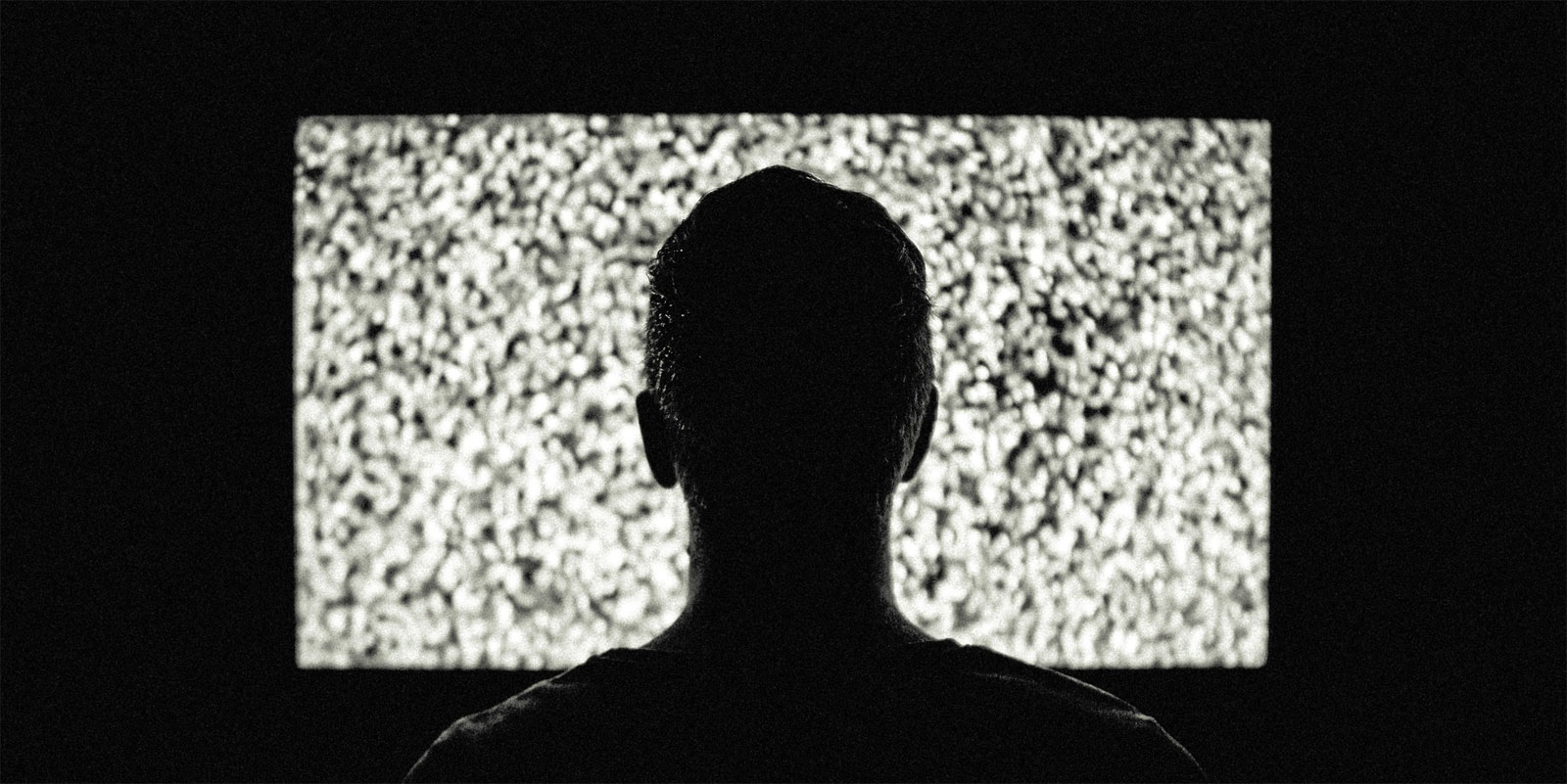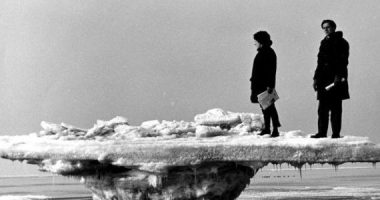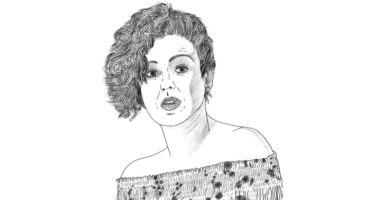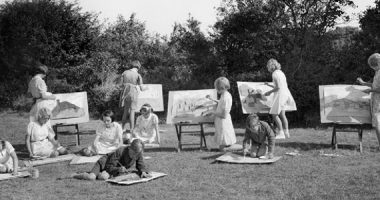
Man in front of a TV with noise. Source: Pexels
What will humans be like in the future? Will evolution affect the human species? Or have we already shaped the environment to suit us? Far from being conformist questions that portray our current situation as the end of a trajectory, when TV series tackle the future they tend to depict quite a dark world ahead of us. Given that the holiday season and the beginning of a new year are usually a time for personal assessment and new resolutions, we asked Serielizados for a post where they recommend TV series that will provide us with some food for thought over Christmas.
When a creative mind imagines what could happen in the future, the conclusions usually show a negative perspective, an alarmed view; or rather, an alarm call for today’s society to recalculate the route, turn back and redress the balance.
At the “Encuentro de Guionistas“ (Screenwriters Gathering) held this past November at the CCCB, Concepción Cascajosa, professor at the Universidad Carlos III de Madrid, pointed out one of the main concerns and trends in TV series: nature’s power. This natural power serves not only as a metaphorical pretext to present a narrative and its characters, but also as a fundamental part of the storyline. The Anthropocene has become an inherent element of the story told.
Humankind’s devastating use of nature as a limitless source has had consequences that TV series are currently echoing from 3 different angles: pollution getting back at us, climate change as a character, and environmental policy.
Jordskott and The Red Road: pollution getting back at us
Human activity has consequences. On these two TV series, our activity against the environment comes back as a threat to humans. In the second season of The Red Road, set at the Indian reservation of the Ramapough mountains (New Jersey), cases of cancer start to arise as a result of chemical pollution in the mountains.
The Swedish series Jordskott, on the other hand, is a genre mix with a twist of fantasy and thriller aimed at advocating for an ecological lifestyle. It tells the story of several little kids who go missing under mysterious circumstances because of forest “pollution”. The environmental battle between a corporation and those who want to protect the forest will put ecology on the table.
Fortitude: when evil derives from climate change
In the fictional town of Fortitude, near the North Pole, the melting of ice caps causes the remains of a prehistoric creature to come to the surface. This anomalous incident will bring lots of convulsion to a town where everything seemed peaceful before. In this sort of polar remake of Babel, the idea of evil will originate and start to hit hard as a consequence of climate change.
Tellus and Okkupert: environmental policy
The Scandinavian tendency to talk about environmental issues was already clear in Jordskott. Finland, however, has taken a step further by producing Tellus, a series about an eco-terrorist cell. What are the limits when championing a cause? Can one change the world through peaceful resistance? Is it more important to change public opinion or to make direct action by sabotaging companies that harm the environment? Tellus is an environmental thriller that opens a discussion about CO2 emissions, renewable energies and vegetarianism.
Our next Scandinavian suggestion is Okkupert. This political fiction dystopia scripted by Norwegian writer Jo Nesbø plays with the idea of Russia occupying Norway with EU consent. The Old Continent’s need for fossil fuels clashes with the political programme of the Norwegian green party, recent election winner who wants to divest from oil.
Nevertheless, human activity does not only affect the environment, but also other matters. Our use (and abuse) of technology and science has conditioned our future as a species and can pose a threat to community life; at least that’s what several TV series tell us. What would happen if the whole planet suddenly faced a permanent power blackout? How would you live if you knew all you saw was recorded and stored in your retina? And what if the machines we have always used had the artificial intelligence to be able to wipe us out as a species?
Here’s a selection of series that expose humans’ use of science and technology against their own benefit. These are some different approaches that depict a future worse than our present:
Black Mirror: technological horror right next to you
One of the first captivating things about Black Mirror has to do with how we can imagine what the series is showing us happening in a not too distant future. Black Mirror is the mirror no one wants to look themselves in, but in which everyone sees their reflection. This is not science fiction about spaceships and explosions; the show is in constant dialogue with reality and playing around with the spectator. We live in a time where there are already enough technological advances for us to regard what Charlie Brooker’s series tell us as a dangerously close future. And this is the series’ greatest virtue: setting off for a dark future without ever losing the viewer’s empathy.
Fringe: Science as both the cause and the solution of problems
When J.J. Abrams decided to write Fringe, the first thing that probably came to mind were Mulder and Scully, the two main characters from The X Files. But he decided not to make the typical science fiction show. He chose to tell the story of how human beings will do anything in order to get what they want. To convey this, Abrams chose science and technology as a starting point for a story that tells us how, because of the actions of scientist Walter Bishop, the Earth starts collapsing between two dimensions. As always, Abrams allowed himself to include a love story that doesn’t add much to the main storyline. What is well worth mentioning in our dystopian science fiction selection is the iconic and genius character of Walter Bishop. As a man who made a huge mistake, he is tempted to change his past. He tries to fix his mistake by going back in time, forgetting ethical and social boundaries. In Fringe, technology and men are the ones responsible for the disaster, but also the only means of fixing the situation.
Battlestar Galactica: AI takeover
“The cylons were created by men. They rebelled. They evolved. They look and feel Human. Some are programmed to think they are Human. There are many copies. And they have a plan”. So begins one of the most memorable science fiction series. Battlestar Galactica tells the story of how machines (robots that had been conceived to do hard labour and be our slaves) eventually acquire artificial intelligence and rise against humankind. Although the initial premise may seem a bit too radical, the show stays rather moderate, without ever taking a stance for humans or for robots. Battlestar Galactica is a clear example of a dystopian show handling one of humanity’s greatest fear: the possibility of having everything taken away from us.
Revolution: back to the Stone Age
Despite this series’ humble impact on critics and viewers, Revolution has a thought-provoking premise: what would happen if our planet was left with no electricity from one day to the next? If Battlestar Galactica and Fringe provided us with hyper-technological scenarios managed with high-security measures, Revolution is exactly the opposite. The future depicted here is a dirty and chaotic one, where the struggle for survival is everyone’s daily bread. Humankind has gone back 100 years and needs to re-adapt to a world without technology. As Albert Einstein said: “I know not with what weapons World War III will be fought, but World War IV will be fought with sticks and stones”. That’s basically what Revolution attempted to convey (ultimately without much success).
https://www.youtube.com/watch?v=y4Bq-h2JCSE
Dystopian science fiction series have always been prone to portraying the Earth as a sick planet. In recent years, we have witnessed how what sparked this illness has been human activity. TV show writers depict a rather dark future for us. Maybe they believe that’s what future will actually be like, or maybe they are just putting us in front of a black mirror in the hope of awakening our consciousness. What is clear is that, in all these stories, we are always the ones to blame.
Trivia: if you love science fiction dystopias, there’s a website you need to check out: Dystopia Tracker reports on dystopias that have already come true. Some of Black Mirror‘s storylines, for instance, have already happened in real life…
This article has been written by Betu Martínez and Víctor Sala, creators of the online magazine Serielizados.





Leave a comment